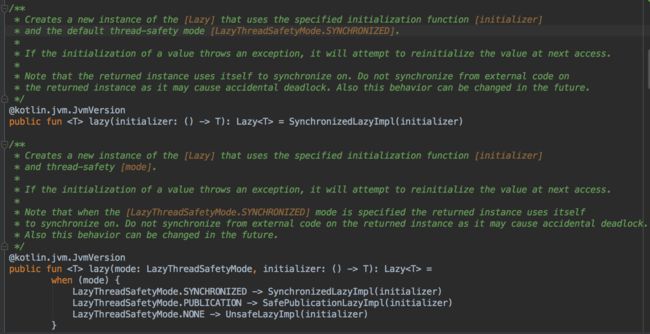Kotlin语言基础笔记
Kotlin流程控制语句笔记
Kotlin操作符重载与中缀表示法笔记
Kotlin扩展函数和扩展属性笔记
Kotlin空指针安全(null-safety)笔记
Kotlin类型系统笔记
Kotlin面向对象编程笔记
Kotlin委托(Delegation)笔记
Kotlin泛型型笔记
Kotlin函数式编程笔记
Kotlin与Java互操作笔记
Kotlin协程笔记
委托模式也叫做代理模式,这是一个非常常用的设计模式,代理模式使得可以用聚合来替代继承(这个也是Effective Java中推荐的方式)。怎么解释代理模式呢?举个海外代购的例子,假如小红有个哥哥小明在米国,小红身边的很多姐妹都非常喜欢coach,gucci的包,但是国内太贵,所以身边的姐妹都会委托小红找她哥哥在米国买好寄回国内。小红和哥哥也能从中获取一些回扣,身边的姐妹也能得到实惠。小红就是代理,代理商。OK,我们用Java代码来描述下:
public interface Buyer {
void buyCoach();
void buyGucci();
}
public class XiaoMing implements Buyer {
@Override
public void buyCoach() {
System.out.println("XiaoMing buy Coach!");
}
@Override
public void buyGucci() {
System.out.println("XiaoMing buy Gucci!");
}
}
public class XiaoHong implements Buyer {
private Buyer xiaoMing;
public XiaoHong(Buyer xiaoMing) {
this.xiaoMing = xiaoMing;
}
@Override
public void buyCoach() {
System.out.println("Brother, please buy Coach for me.");
xiaoMing.buyCoach();
System.out.println("Thanks Brother, I will give some money to you.");
}
@Override
public void buyGucci() {
System.out.println("Brother, please buy Gucci for me.");
xiaoMing.buyGucci();
System.out.println("Thanks Brother, I will give some money to you.");
}
public static void main(String[] args) {
Buyer xiaoHong = new XiaoHong(new XiaoMing());
xiaoHong.buyCoach();
xiaoHong.buyGucci();
}
}
运行上面的代码,输出:
Brother, please buy Coach for me.
XiaoMing buy Coach!
Thanks Brother, I will give some money to you.
Brother, please buy Gucci for me.
XiaoMing buy Gucci!
Thanks Brother, I will give some money to you.
1. 类的委托
Kotlin在语言层面原生支持委托模式。上面的Java改写如下:
interface Buyer{
fun buyCoach()
fun buyGucci()
}
class XiaoMing : Buyer{
override fun buyCoach() {
println("XiaoMing buy Coach!")
}
override fun buyGucci() {
println("XiaoMing buy Gucci!")
}
}
class XiaoHong(val realBuyer: Buyer) : Buyer by realBuyer {
override fun buyCoach() {
println("Brother, please buy Coach for me.")
realBuyer.buyCoach()
println("Thanks Brother, I will give some money to you.")
}
override fun buyGucci() {
println("Brother, please buy Gucci for me.")
realBuyer.buyGucci()
println("Thanks Brother, I will give some money to you.")
}
}
fun main(args: Array) {
val xiaoHong = XiaoHong(XiaoMing())
xiaoHong.buyCoach()
xiaoHong.buyGucci()
}
请注意by realBuyer 表示XiaoHong的所有共有方法委托给一个指定的对象readlBuyer。如果你不想要XiaoHong说太多废话的话,你可以用简单的一行代码定义XiaoHong:
class XiaoHong(val realBuyer: Buyer) : Buyer by realBuyer
这就是所谓的在语言层面支持委托,确实比Java简洁太多。
2. 属性委托
对于Kotlin类中的属性,我们也可以使用委托来赋予属性一些牛逼的特性,这些特性在Java中可能需要我们写很多代码来实现,但是在Kotlin中一切将变得so easy!
2.1 属性的委托
看一个例子:
class DelegatePropertiesDemo {
var content: String by Content()
override fun toString(): String {
return "DelegatePropertiesDemo Class"
}
}
class Content {
operator fun getValue(delegatePropertiesDemo: DelegatePropertiesDemo, property: KProperty<*>): String {
return "${delegatePropertiesDemo} property '${property.name}' = 'Balalala ... ' "
}
operator fun setValue(delegatePropertiesDemo: DelegatePropertiesDemo, property: KProperty<*>, value: String) {
println("${delegatePropertiesDemo} property '${property.name}' is setting value: '$value'")
}
}
fun main(args: Array) {
val delegatePropertiesDemo = DelegatePropertiesDemo()
println(delegatePropertiesDemo.content)
delegatePropertiesDemo.content = "abc"
}
运行上面例子输出:
DelegatePropertiesDemo Class property 'content' = 'Balalala ... '
DelegatePropertiesDemo Class property 'content' is setting value: 'abc'
上面这个例子可以看出,DelegatePropertiesDemo的content属性的getter/setter是分别委托给下面这个Content类的getValue和setValue方法。注意getValue和setValue方法必须要使用operator修饰。
2.2 懒加载属性委托 lazy()函数
我们先来看看lazy()函数的定义:
它接收一个lambda表达式,并返回一个Lazy
第二个方法是的第一个参数是线程安全模式,默认是线程安全的。
fun main(args: Array) {
val firstTimestamp by lazy { System.currentTimeMillis() }
println(firstTimestamp)
Thread.sleep(1000)
println(firstTimestamp)
}
输出的两次时间戳是一样的。
1520010381034
1520010381034
如果委托多个线程同时执行,不需要同步锁,可以使用LazyThreadSafetyMode.PUBLICATION参数。
如果是在单线程环境中,可以使用LazyThreadSafetyMode.NONE参数,这也是性能最高。
2.3 可观察属性委托
我们把属性委托给Delegates.observable函数,当属性被赋值时,会触发其中的回调函数onChange。
fun main(args: Array) {
var level:String by Delegates.observable("P0", {property: KProperty<*>, oldValue: String, newValue: String -> println("$oldValue -> $newValue") })
}
输出:
P0 -> P1
P1 -> P2
P2 -> P3
2.4 可否决属性委托
函数定于如下:
可以通过onChange函数返回值是否为true,来让属性的值是否需要变化。
class PostHierarchy {
var grade: String by Delegates.vetoable("T0", {
property, oldValue, newValue ->
true
})
var notChangeGrade: String by Delegates.vetoable("T0", {
property, oldValue, newValue ->
false
})
}
val ph = PostHierarchy()
ph.grade = "T1"
ph.grade = "T2"
ph.grade = "T3"
println(ph.grade) // 打印T3
ph.notChangeGrade = "T1"
ph.notChangeGrade = "T2"
ph.notChangeGrade = "T3"
println(ph.notChangeGrade) // 打印T0
2.5 非空属性委托
var name: String by Delegates.notNull()
这样name属性就被限制为不能为null,如果被赋值null,编译器直接报错:
2.6 属性委托给Map
我们也可以把一个类中的属性委托给Map:
class User(val map: MutableMap){
var name:String by map
var age:Int by map
override fun toString(): String {
return "User(name = $name, age = $age)"
}
}
fun main(args: Array) {
val user = User(mutableMapOf(
"name" to "Denny Deng",
"age" to 34
))
println(user)
user.age = 36
println(user.map["age"])
}
输出:
User(name = Denny Deng, age = 34)
36
你可以看到修改了map的值,能影响到user的name和age属性,修改了user的属性值也能影响到map的值。


